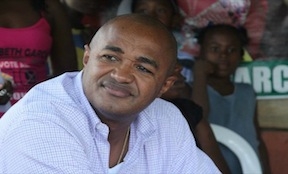Thirty-two public figures, including former and current politicians, have been arrested in Colombia’s northwestern Uraba region for ties to paramilitaries, in a case highlighting the continued specter of political-criminal ties.
According to Colombia’s Attorney General’s Office, the list of those arrested for alleged links with the now defunct United Self-Defense Forces of Colombia (AUC) includes the current mayor of the town of Turbo, former candidates for the Senate and the State Assembly of Antioquia, and former Uraba mayors, councilmen, and political and civic leaders.
The Attorney General’s Office reported that those arrested had been connected to the AUC’s Elmer Cardenas Bloc. That faction was led by the now imprisoned paramilitary Freddy Rendon Herrera, alias “El Aleman,” who during his time as a paramilitary sought to promote the group’s political ties across a number of northwestern Colombian states, many of which are part the Uraba region.
The Attorney General’s Office told Insight Crime the arrests were the product of investigations into confessions by demobilized AUC leaders following what was known as the Justice and Peace Process between the government and the AUC in the mid-2000s.
InSight Crime Analysis
The cases show that despite years of arrests, prosecutions and sentences, paramilitary-political links persist in Colombia.
Since the AUC formally completed the demobilization process in 2006, revelations regarding their infiltration into the country’s political structures and armed forces — popularly known as the “parapolitics” scandal — have led to the arrests of top military commanders and members of former President Alvaro Uribe’s family, as well as investigations into numerous current and former politicians. Congress was particularly affected: more than 30 congressmen elected in 2006 had been arrested for alleged ties to paramilitaries by 2008.
Yet, as this case shows, AUC-linked politicians still control important local public positions. The issue also came up during elections this past March, when 69 candidates with alleged direct or indirect ties to illegal groups — including paramilitaries and their successor groups, known as BACRIM (from the Spanish abbreviation for “criminal bands”) — were elected to Congress.
SEE ALSO: AUC Profile
Uraba, where the recently arrested officials worked, is one of the worst cases. This is in part because the region serves as a key drug transshipment point due to its location near the Panamanian border and access to the Caribbean and Pacific Coasts. The AUC used this perch to become a huge international purveyor of cocaine.
In the 1990s and 2000s, Uraba was predominately controlled by paramilitary groups who also sponsored politicians some of whom were handpicked by AUC commanders. The region is now a stronghold for the Urabeños criminal group, which has its roots in the AUC.

